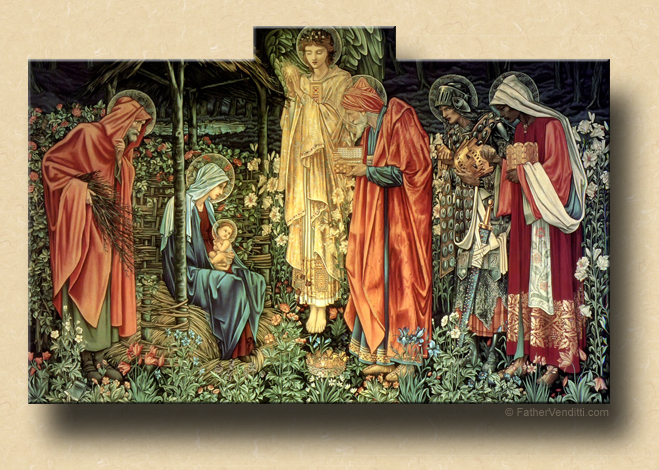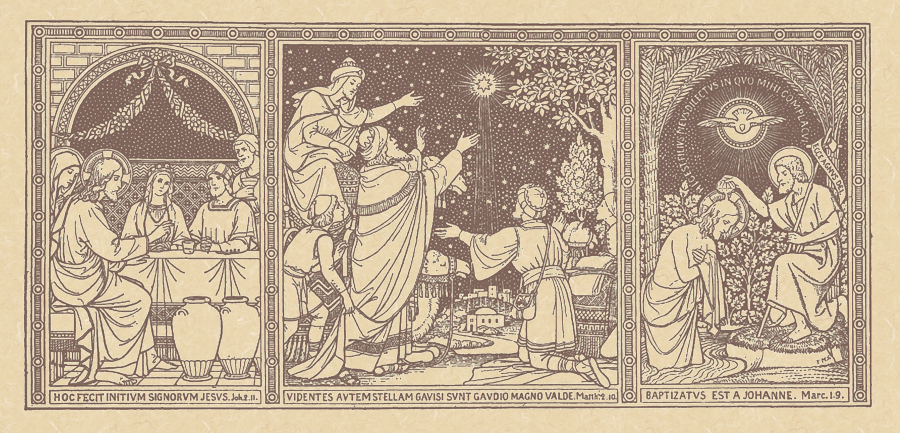The Epiphany vs. the "Social Gospel."
The Friday after the Epiphany.
Lessons from the feria, according to the ordinary form of the Roman Rite:
• I John 5: 5-13.
• Psalm 147: 12-15, 19-20.
• Luke 5: 12-16.
FatherVenditti.com
|
1:52 PM 1/9/2015 — During this brief Epiphany season I've given you a lot to think about, and the season ends on Sunday with the Feast of the Baptism of the Lord; so, today I would like to briefly wrap it up with a little review of the mysteries of our Faith that the season presents to us.

Traditionally, Epiphany means “manifestation,” and commemorates three events in the life our Blessed Lord: His manifestation to the gentiles in the visit of the Magi, His manifestation as the co-eternal Son of God in His baptism by John, and His manifestation as God Incarnate in the miracle at the wedding at Cana. In the extraordinary form all this is very explicit; in the ordinary form which we celebrate here it becomes a little muffled, inasmuch as the three are separated liturgically, with Epiphany itself focusing on the visit of the Magi, the Baptism of the Lord being given its own feast this coming Sunday, and the Wedding at Cana being observed sometimes and only as an afterthought—in fact, it won't be commemorated at all this year, as that Gospel is only read in Ordinary Time in cycle C, and this year is cycle B.
But the threefold commemoration of the traditional observance is still there for us to consider. Wednesday, when the Gospel of our Lord's first walking upon the sea was read, I pointed out that the Epiphany was more than just a simple commemoration of the visit of the Magi, as that simple event wouldn't warrant a feast of that importance; that it's really a feast of the Divinity of Christ. In that Gospel lesson from Mark, a single verse adds the oft past over mention that Christ, walking on the water toward the boat, meant to pass them by, and how this is part of what we noticed was the “Theophany language” or “Epiphany language” of the Old Testament: God first reveals Himself to those to whom He comes in subtle ways, often simply passing by, leaving it to us to notice Him and pursue Him. Recall the example of our Lord's post-resurrection appearance to the disciples on the road to Emmaus: at the end of the journey, when the two disciples have reached their destination, all the while not recognizing Jesus in His glorified body, he makes to leave them and continue on alone; but, they ask him to stay on with them. His pretending to continue on is a ruse; it forces them to act on their own initiative: if they want Jesus to stay with them, they're going to have to ask.
In the Roman Breviary, the response after the first lesson of Matins today summarizes the visit of the Magi in mystical terms: “The Magi worshiped the author of our salvation in the crib, and of their treasures they brought to Him gifts of mystic nature. Gold shows the King's power; frankincense makes us think of the great High Priest; myrrh points forward to the Lord's burial”; which brings us full circle to where it all began on the Feast of the Nativity, wherein, you will recall, we reflected on the relationship between the manger and the cross. Jesus is born for the purpose of dying on the cross; and, it is not entirely an inappropriate devotion to believe, as many have in the past, that the myrrh presented to the Child by one of the Magi at his birth was kept by the Mother of God to be used to anoint the Body of Her Son after His crucifixion.
With the Feast of the Baptism on Sunday, Christmas and Epiphany come to an end, but not our prayerful reflections on these great mysteries; and, as the Gospel lessons of Ordinary Time present to us the message and actions of our Lord's public ministry among us, let us always keep these mysteries in mind, lest we forget that our Lord's practical and even spiritual lessons on life cannot be properly understood except within the context of Who and What He is. He is no social teacher, His Gospel is not a blueprint for society, nor is His message reducible to a program of good deeds and helping the poor and needy. Christ was not born into the flesh, grace us with an earthly presence, suffer and die for our sins, rise by His own power and return to His Father with Whom He shares undiluted divinity to show us how to create some sort of charitable utopia here on earth; he did these things so that we could, if we want to, reach heaven, and live with Him there forever long after this world and it's concerns have ceased to exist. What Jesus says and what Jesus does is meaningless if we do not understand that He is God; or, as the Blessed Apostle John tells us today in his first Epistle: “God gave us eternal life, and this life is in his Son” (I John 5: 11 NABRE).

|

